| Listing 1 - 10 of 20 | << page >> |
Sort by
|
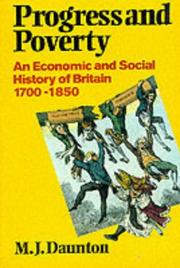
ISBN: 0198222815 0198222823 0191586730 0585229937 9780191586736 9780198222811 1383011230 Year: 1995 Publisher: Oxford : Oxford university press,
Abstract | Keywords | Export | Availability | Bookmark
 Loading...
Loading...Choose an application
- Reference Manager
- EndNote
- RefWorks (Direct export to RefWorks)
Intended for students and 6th-formers studying 18th- and 19th-century British history, this text presents an economic and social history of Britain from 1700-1850.
History of the United Kingdom and Ireland --- anno 1700-1799 --- anno 1800-1899 --- Great Britain --- Grande-Bretagne --- Economic conditions --- Social conditions --- Conditions économiques --- Conditions sociales --- Conditions économiques --- E-books --- Great Britain - Economic conditions - 18th century --- Great Britain - Economic conditions - 19th century --- Great Britain - Social conditions - 18th century --- Great Britain - Social conditions - 19th century

ISBN: 0197263267 9780197263266 Year: 2005 Publisher: Oxford : Oxford university press,
Abstract | Keywords | Export | Availability | Bookmark
 Loading...
Loading...Choose an application
- Reference Manager
- EndNote
- RefWorks (Direct export to RefWorks)
Connaissance [Sociologie de la ] --- Kennis [Sociologie van de ] --- Knowledge [Sociology of ] --- Sociologie van de kennis --- Sociology of knowledge --- Knowledge, Sociology of. --- 942.081 --- 655.4 <41> --- Geschiedenis van Engeland: Victoria I; Victoriaanse tijd--(1837-1901) --- Uitgeverij. Boekhandel--algemeen--Verenigd Koninkrijk van Groot-Brittannië en Noord-Ierland --- 942.081 Geschiedenis van Engeland: Victoria I; Victoriaanse tijd--(1837-1901) --- Knowledge, Sociology of --- Knowledge, Theory of (Sociology) --- Communication --- Knowledge, Theory of --- Public opinion --- Sociology --- Social epistemology --- Great Britain --- Civilization --- Intellectual life --- 19th century
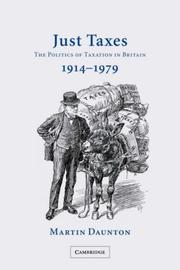
ISBN: 9780521039796 0521814006 0521039797 1107316081 1107321476 1107317940 0511550022 1107317045 1107315107 129939924X 9780521814003 9780511550027 9781107321472 1107133475 1139809784 9781107317048 9781107133471 9781139809788 9781107316089 9781107317949 9781107315105 Year: 2002 Publisher: Cambridge Cambridge University Press
Abstract | Keywords | Export | Availability | Bookmark
 Loading...
Loading...Choose an application
- Reference Manager
- EndNote
- RefWorks (Direct export to RefWorks)
In 1914, taxation was about 10 per cent of GNP; by 1979, taxes had risen to almost half of the total national income, and contributed to the rise of Thatcher. Martin Daunton continues the story begun in Trusting Leviathan, offering an analysis of the politics of acceptance of huge tax rises after the First World War and asks why it did not provoke the same levels of discontent in Britain as it did on the continent. He further questions why acceptance gave way to hostility at the end of this period. Daunton views taxes as the central driving force for equity or efficiency. As such he provides a detailed discussion of their potential in providing revenue for the state, and their use in shaping the social structure and influencing economic growth. Just Taxes places taxation in its proper place, at the centre of modern British history.
Taxation --- Impôt --- History --- Histoire --- Fiscal policy --- -Taxation --- -Duties --- Fee system (Taxation) --- Tax policy --- Tax reform --- Taxation, Incidence of --- Taxes --- Finance, Public --- Revenue --- Economic policy --- -History --- -Government policy --- Arts and Humanities --- -Fiscal policy --- Impôt --- Duties --- Government policy --- Great Britain --- Politics and government --- E-books
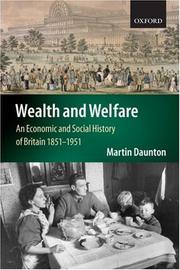
ISBN: 9780198732099 0198732090 9786611160463 019152493X 1281160466 1435609778 9780191524936 6611160469 1383032351 Year: 2007 Publisher: Oxford ; New York : Oxford University Press,
Abstract | Keywords | Export | Availability | Bookmark
 Loading...
Loading...Choose an application
- Reference Manager
- EndNote
- RefWorks (Direct export to RefWorks)
Martin Daunton examines the continuities and changes that occurred in the social and economic history of Britain, from the Great Exhibition of 1851 to the Festival of Britain in 1951. He also streses modernity and the growth of new patterns of consumption in areas such as the service sector and the leisure industry.
Great Britain --- Grande-Bretagne --- Economic conditions --- Social conditions --- Conditions économiques --- Conditions sociales --- 330.94108 --- -Economic conditions --- -Social conditions --- -330.94108 --- -Great Britain --- Conditions économiques --- E-books
Book
ISBN: 1474284965 1474241247 9781474241243 9781474241236 1474241239 9781474241380 9781474284967 Year: 1985 Publisher: London : Bloomsbury Academic,
Abstract | Keywords | Export | Availability | Bookmark
 Loading...
Loading...Choose an application
- Reference Manager
- EndNote
- RefWorks (Direct export to RefWorks)
"The history of the post office involves many of the most significant themes in the social, economic and political history of Britain. Daunton traces the development of the post office as an institution and as a business in the 19th and 20th centuries and places the debates surrounding its history, performances and failings in a longer historical perspective and in the broader context of British national history."--Bloomsbury Publishing.
Postal service --- History. --- Great Britain. --- England and Wales. --- GPO (Great Britain) --- G.P.O. (Great Britain) --- British Post Office --- Post Office (Great Britain)
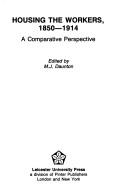
ISBN: 1474241263 9781474241267 0718513150 1474241255 9781474241250 147428485X 9780718513153 9781474284851 Year: 2015 Publisher: London : Bloomsbury Academic,
Abstract | Keywords | Export | Availability | Bookmark
 Loading...
Loading...Choose an application
- Reference Manager
- EndNote
- RefWorks (Direct export to RefWorks)
"In the past, accounts of housing were dominated by the analysis of the problems of slum property at the bottom of the market, and the way in which public housing emerged from attempts to ameliorate the worst conditions, in an apparently inevitable process. This title questions this perception by focussing on the process of development, architectural forms, the pattern of ownership, property management and control, and public policy."--Bloomsbury Publishing.
Low-income housing --- Working class --- Commons (Social order) --- Labor and laboring classes --- Laboring class --- Labouring class --- Working classes --- Social classes --- Labor --- Poor --- Housing --- Inclusionary housing programs --- History --- Housing&delete& --- Employment --- E-books --- België --- Brussel --- cités --- geschiedenis --- negentiende eeuw --- ruimtelijke ordening --- sociale woningbouw --- stedenbouw --- twintigste eeuw --- volkshuisvesting --- werkmanswoningen --- History. --- Social stratification --- History of Europe --- anno 1800-1999 --- Pauvres --- Travailleurs --- Logement --- Histoire --- Poor - Housing - History. --- Working class - Housing - History. --- Low-income housing - History.
Book
ISBN: 1282620797 9786612620799 1846156769 1843833832 Year: 2008 Publisher: Woodbridge, UK ; Rochester, NY : Boydell Press,
Abstract | Keywords | Export | Availability | Bookmark
 Loading...
Loading...Choose an application
- Reference Manager
- EndNote
- RefWorks (Direct export to RefWorks)
In the course of the nineteenth century, the economic structure and policies of Britain were remade, as the costs of the 'fiscal-military' state which fought successful wars against France were cut, and monopolies gave way to free trade, while monetary policy was determined by the automatic operation of the gold standard. However, the result was not, as might be expected, the triumph of 'laissez faire'; there was continued concern about the moral and social consequences of economic change. In this magisterial collection, Professor MARTIN DAUNTON looks at the connections between state and market in this period, and the ways in which all society was affected. He argues that central to the politics of Victorian Britain was determining where the line should be drawn between private profit and social costs - a task that implicated the courts and politicians in defining the nature of capitalist society. The outcome was not determined by 'gentlemanly capitalists' comprising landowners and financiers who dominated the state and denied a voice to industrialists and their workers. Rather, the choices reflected the interplay between all interests, including those of the state itself. MARTIN DAUNTON is Master of Trinity Hall and Professor of Economic History at the University of Cambridge.
Great Britain --- Economic policy. --- Economic conditions --- Social conditions --- HISTORY / Modern / General.
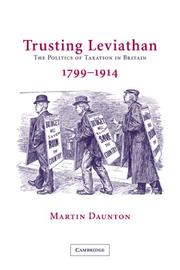
ISBN: 9780521037488 0521037484 Year: 2007 Publisher: Cambridge : Cambridge university press,
Abstract | Keywords | Export | Availability | Bookmark
 Loading...
Loading...Choose an application
- Reference Manager
- EndNote
- RefWorks (Direct export to RefWorks)
Political science. --- Taxation --- Taxation. --- History --- 1800-1999. --- Great Britain --- Great Britain. --- Politics and government
Book
ISBN: 9781846156762 9781843833833 Year: 2008 Publisher: Suffolk Boydell & Brewer
Abstract | Keywords | Export | Availability | Bookmark
 Loading...
Loading...Choose an application
- Reference Manager
- EndNote
- RefWorks (Direct export to RefWorks)
Book
ISBN: 0571146155 Year: 1987 Publisher: London Faber and Faber
Abstract | Keywords | Export | Availability | Bookmark
 Loading...
Loading...Choose an application
- Reference Manager
- EndNote
- RefWorks (Direct export to RefWorks)
| Listing 1 - 10 of 20 | << page >> |
Sort by
|

 Search
Search Feedback
Feedback About UniCat
About UniCat  Help
Help News
News